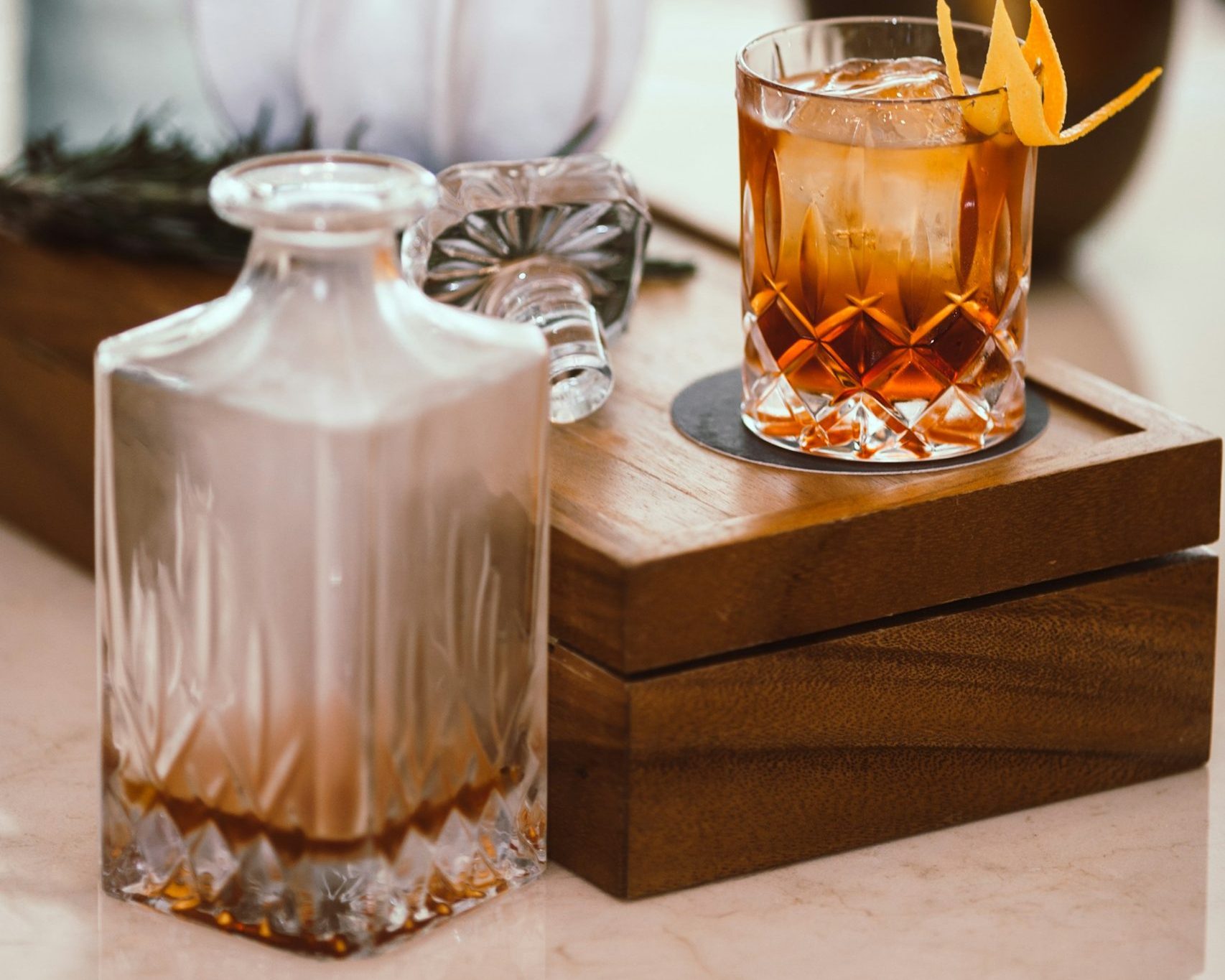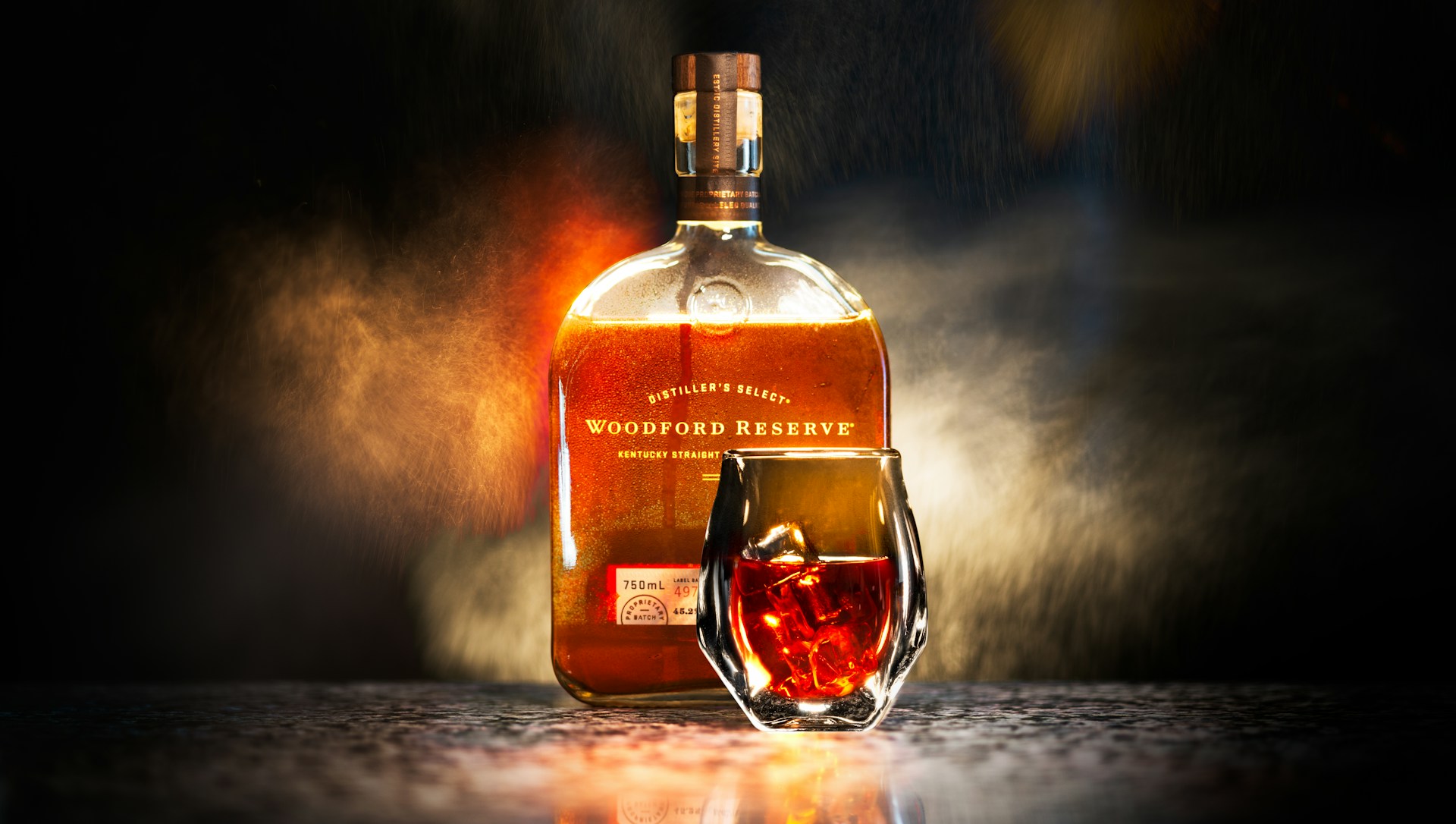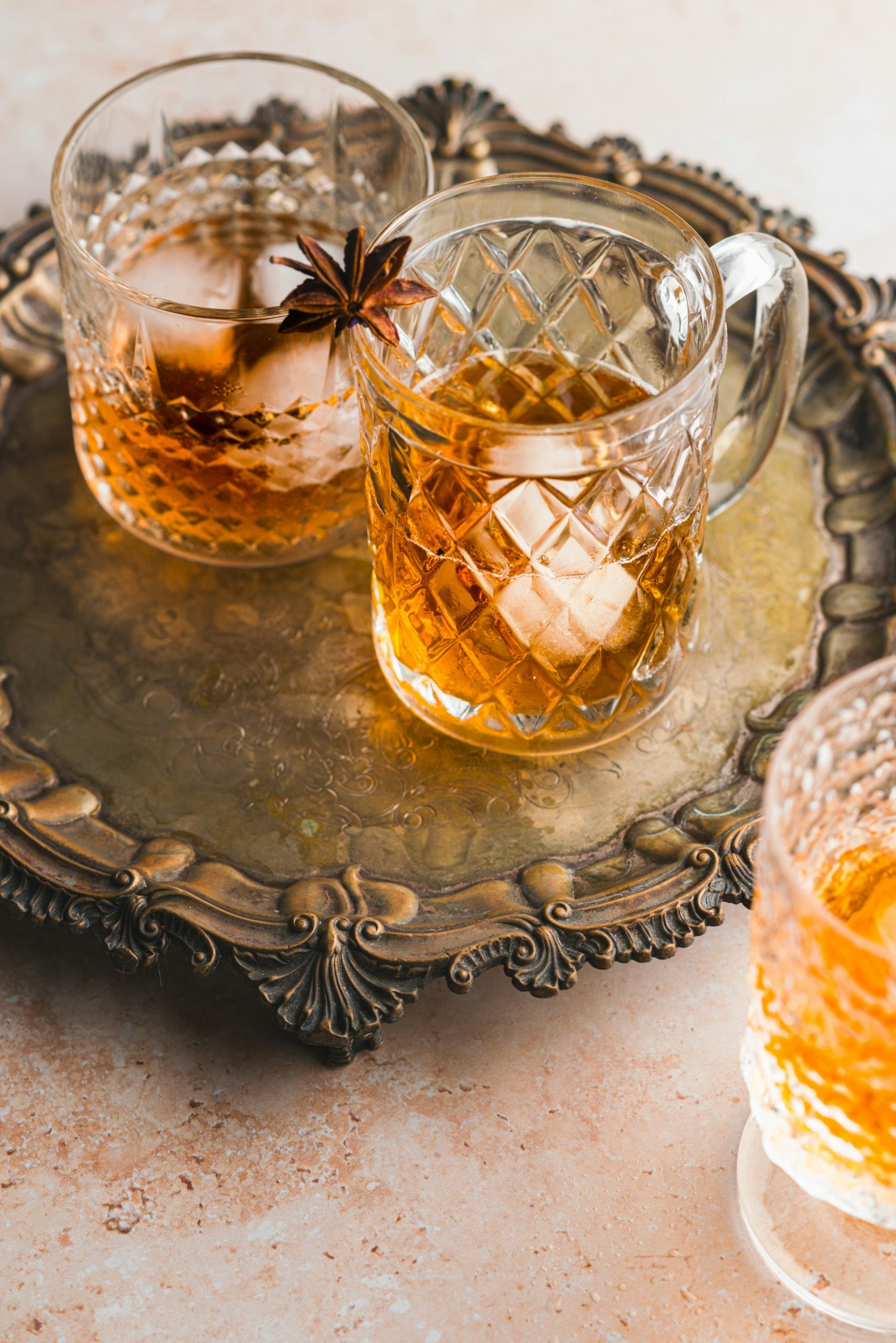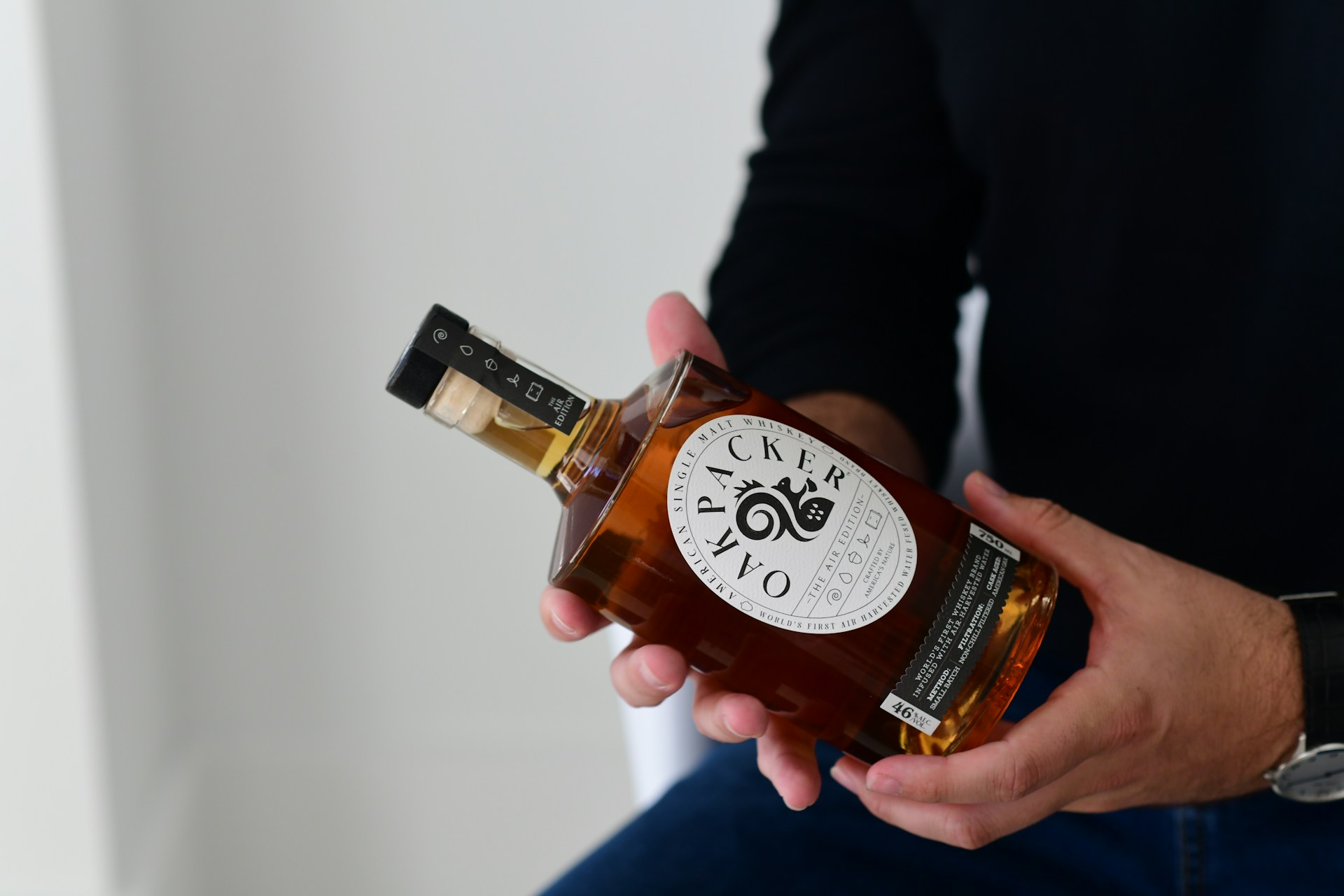Why Use a Decanter for Whisky – Unveiling the 5 Benefits
You see them in the movies all the time. Tucked in the corner of a Manhattan skyscraper office of some financial fat cat, oh yes, there it is, the obligatory whisky decanter.
But do these ornate vessels actually do anything?
Or are they just there for show?
Let’s find out.
What Is a Decanter?
A decanter for whisky serves both functional and aesthetic purposes. Traditionally made from high-quality glass or crystal, it provides an elegant way to store and present whisky, elevating the overall drinking experience. Functionally, a decanter can aid in the aeration process during pouring, allowing the whisky to breathe and potentially enhance its aromas and flavours. Additionally, decanters often come with airtight stoppers that help preserve the spirit’s quality by minimising oxidation.
5 Benefits of Using a Decanter
Decanting spirits, especially whisky, add a touch of class to your drinking experience while potentially enhancing the flavour profile of your beverage.
#1 Aesthetics
Decanting whisky allows for a more refined visual presentation by eliminating the often garish and cluttered branding found on commercial bottles. A sleek, crystal decanter not only complements the decor of any room but acts as a centrepiece, highlighting the rich, amber hues of the whisky within. This subtle yet sophisticated touch enhances the ambiance, making the drinking experience feel more luxurious and cohesive.
#2 Aeration & Oxidation
During pouring, decanters allow whisky to breathe by exposing it to air, which can mellow the spirit’s harsher notes and let the subtler flavours come forward. This increased exposure to oxygen can make the whisky smoother and more pleasurable to drink. While whisky doesn’t need to breathe as long as wine, a short period in a decanter can still make a noticeable difference.
This process is not about ageing the whisky further but rather about letting it ‘open up’ after being confined in a bottle. Aeration can reveal layers of complexity in the whisky’s profile, enhancing the overall tasting experience.
#3 Removal of Sediment
Sediment in whisky can occur naturally, especially in non-chill-filtered varieties. It’s the result of small particles that weren’t filtered out during production or that developed over time. While not harmful, sediment can detract from the smoothness and clarity of your drink.
Transferring your whisky to a decanter, you can leave the sediment in the bottle resulting in a cleaner and more aesthetically pleasing dram.
#4 Preserving Whisky
A well-sealed decanter will protect your whisky from oxidation over time, maintaining its original flavours and aromas. Decanters typically come with airtight stoppers that prevent the evaporation of alcohol, ensuring the whisky retains its potency. This attention to preservation allows you to enjoy your whisky at its best, sip after sip.
#5 Serving Experience
Compared to the original bottle, pouring whisky from a heavy decanter is a tactile experience that adds a sense of ceremony to the drink. The cool, solid feel of the decanter in your hands makes the act of pouring more deliberate and intimate. As the amber liquid flows smoothly from the finely crafted vessel, it elevates the entire moment, transforming a simple pour into a ritual that enhances the anticipation and appreciation of the whisky’s rich flavours and aromas.
5 Types of Whisky Decanters
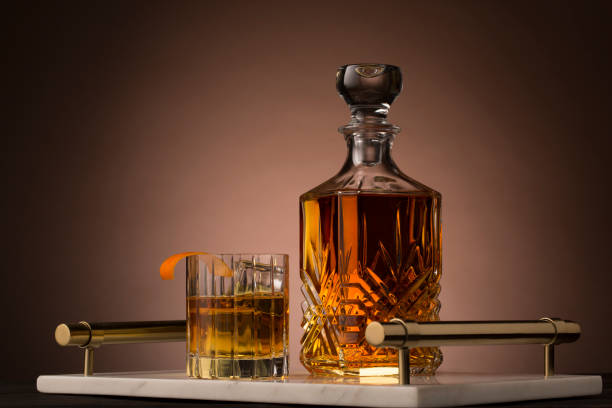
Whisky decanters come in various shapes, each made from glass or crystal. They range from traditional designs with a stopper or lid to modern styles, all serving as an elegant decanter for spirits. Listed below are the five main types.
#1 Traditional Crystal Decanters
Traditional crystal decanters add a touch of sophistication to any bar cart. They are visually appealing and intricately designed, making them a statement piece. However, they can be fragile and sometimes contain lead, which is a concern for long-term spirit storage. Crystal decanters for spirits are also heavier and require more careful handling.
Despite these cons, their unmatched elegance in whisky presentation makes them a popular choice for a classic look.
#2 Modern Glass Decanters
Modern glass decanters offer a contemporary twist with cleaner lines and minimalist designs. They’re usually lead-free, making them safer for long-term use. These decanters are also more durable than their crystal counterparts, resisting chipping and cracking easily.
However, they may lack the classic allure of traditional styles. Some might find modern glass decanters less visually impactful, but they compensate with practicality and a modern aesthetic.
#4 Ship’s Decanters
Ship’s decanters have a wide base, originally designed to prevent tipping at sea, which now adds stability to your bar cart. This shape also increases surface area, enhancing whisky aeration.
Their bulkiness might be inconvenient for smaller spaces or those preferring a simpler look. Yet, for fans of nautical charm, a ship’s decanter is a conversation starter and a nod to history.
#5 Square or Rectangular Decanters
Square or rectangular decanters offer a modern edge and fit neatly on shelves or bar carts. Their straight lines and defined edges make a bold statement and save space. However, they might not suit everyone’s taste and can be less ergonomic for pouring. Despite this, they appeal to those who prefer a contemporary design for decanting spirits.
#6 Round or Globe Decanters
Round or globe decanters are visually intriguing, often doubling as art. Their spherical shape can be a talking point and adds unique intrigue to your whisky collection. While aesthetically pleasing, they may not be the most practical for pouring or storing and can take up more space. Yet for those who value artistic flair, these decanters are a favourite.
Caring for Your Decanter
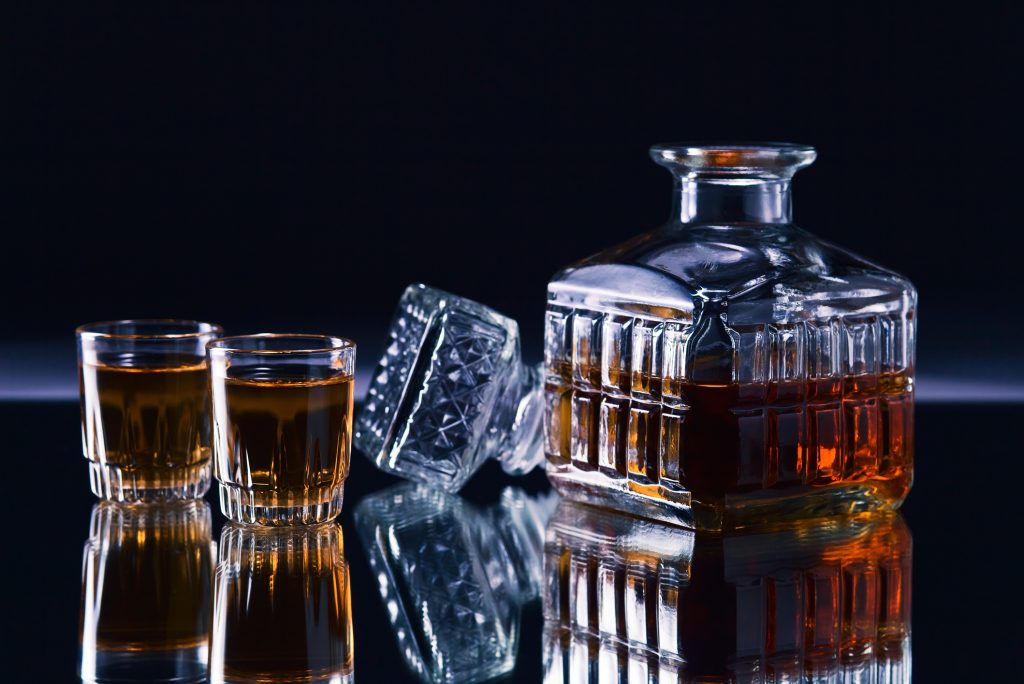
Caring for your decanter for spirits is crucial to ensure its longevity and the quality of your whisky. Regular cleaning and proper storage are key to preserving clarity of the vessel whilst preventing unwanted flavours from affecting your spirits.
Due to the intricate nature of some decanters (especially the old fashioned ones with loads of facets and tight corners) they can be difficult to clean.
Here’s some tips on how to keep your decanter crystal clear.
#1 Always rinse your decanter with warm water after use to remove any residual whisky. This prevents any build-up or stains from forming.
#2 Use a mild soap and a soft brush or cloth to clean the interior gently, being careful not to scratch the glass.
#3 For a crystal-clear finish, rinse thoroughly with warm water to eliminate any soap suds or streaks.
#4 Dry your decanter upside down on a rack to ensure all moisture drips away, avoiding water spots that can detract from its gleaming appearance.
Regular maintenance of your decanter is as essential as its initial cleaning. Inspect the stopper or lid seal periodically to ensure it remains airtight. If you notice any chips or cracks, it’s time to replace the decanter to keep your whisky safe from oxidation.
Additionally, decanters should be polished with a lint-free cloth to maintain their shine and clarity. This not only keeps them looking their best but also allows you to detect any potential issues early on.
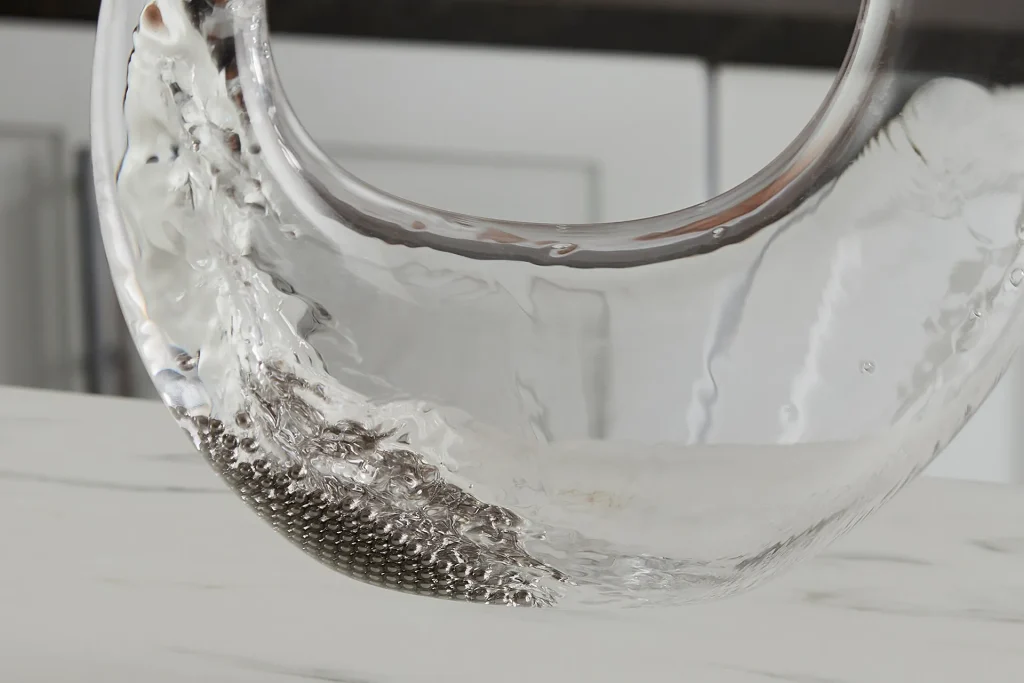
Pro tip: For decanters with intricate designs or hard-to-reach areas, consider using specialised cleaning beads or brushes. These tools can help dislodge any trapped sediment without damaging the decanter’s interior. It’s also advisable to avoid harsh chemicals and abrasive materials that can etch or dull the surface of your decanter. Stick to gentle cleaning agents and tools designed for use with fine glassware.
Lastly, it’s important to let your decanter air dry completely before storing it. Any leftover moisture can lead to musty odours or mould growth, which could ruin both the decanter and the taste of your whisky. By ensuring your decanter is dry, you are taking an important step in preserving the quality and cleanliness of your spirits.
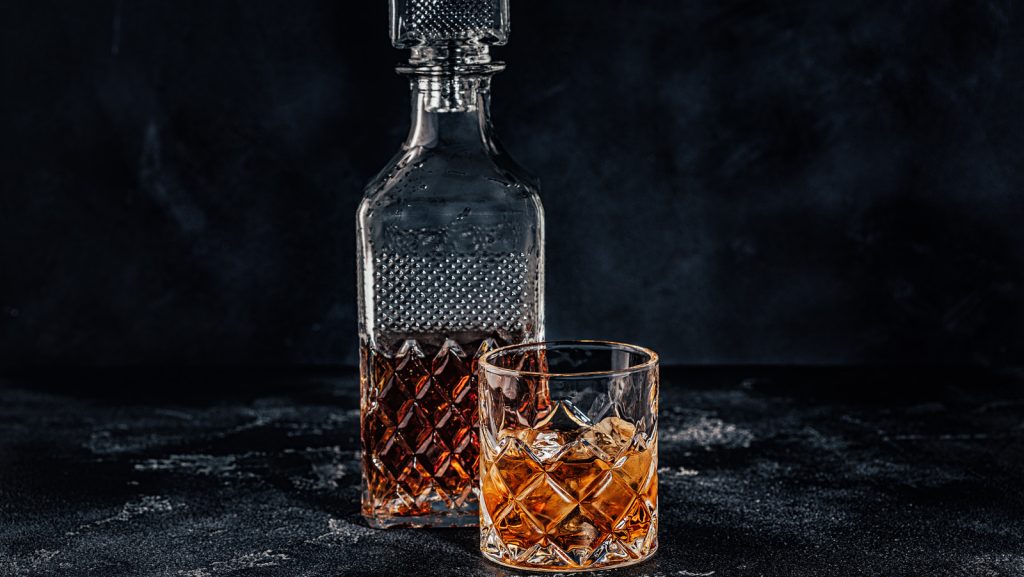
Best Way to Store Whisky in a Decanter
When it comes to storing your decanter for spirits, location is everything. You’ll want to find a spot that’s away from direct sunlight, as UV rays can break down the complex flavours of your whisky.
A dark cabinet or shaded bar area is ideal. Also, consider the temperature at which the decanter will be kept. Extreme temperature fluctuations can negatively affect the whisky, so aim for a consistent, cool environment to maintain its optimal condition.
It’s not just about where you place your decanter, but also how you position it. Always ensure that your decanter is stored upright to prevent the whisky from coming into prolonged contact with the stopper or lid. This is especially important if the decanter has a metal element, as it could potentially alter the flavour of the whisky. Storing the decanter upright also helps prevent any leaks or spills, keeping your treasured spirits secure.
If your decanter will not be used for extended periods, consider emptying it and storing it dry. While decanters are designed to protect your whisky, prolonged storage in the same container is not recommended. By emptying and cleaning your decanter between uses, you can ensure that each time you fill it, your whisky will taste as fresh and flavourful as when it was first opened.
Mistakes to Avoid When Using a Decanter
When using a decanter for spirits, there are a few common pitfalls to be aware of that can lead to damage or deterioration.
#1 Avoid overexposure to air. While a decanter provides a certain level of protection, leaving whisky exposed to the air for too long can initiate an oxidation process that may dull its flavours. Make sure to seal your decanter properly with its stopper or lid after each use.
#2 Neglecting regular cleaning. Residue build-up can impart off-flavours to your whisky and affect the clarity of your decanter. Clean your decanter after each use to prevent any potential contamination. Also, be mindful of the cleaning agents you use, as harsh chemicals can damage the decanter’s material and affect the taste of the whisky.
#3 Be cautious of where you place your decanter. Keeping it in direct sunlight, near heat sources, or in places with high-temperature fluctuations can all have adverse effects on the quality of your whisky. Choose a storage location that is cool, dark, and stable to preserve both your decanter and the spirits within it.

6 Factors to Consider When Choosing a Decanter for Your Whisky
When selecting a decanter for your bottles of scotch or other whiskies, there are several factors to consider to ensure you’re making the right choice for both aesthetic and practical purposes.
#1 Material. Crystal decanters are traditional and have a timeless elegance, but ensure you opt for lead-free crystal to avoid any potential health risks and to prevent the lead from leaching into the whisky.
#2 Shape. A classic decanter with a narrow neck is ideal for preserving the aroma and flavour of the whisky, as it limits the surface area exposed to the air. Conversely, prestige decanters often have unique designs that can serve as a conversation piece, even if they are not the most practical for prolonged storage.
#3 Volume. Consider the capacity of the decanter in relation to your typical whisky consumption. A decanter that holds a 750ml bottle is standard, but if you prefer to decant smaller amounts, consider a decanter with a smaller volume to avoid having whisky stored in a decanter for too long. This can help prevent overexposure to air and potential flavour degradation.
#4 Aesthetic. Whether you’re drawn to the sleek lines of modern glass decanters or the sturdy feel of ship decanters, choose one that you’ll enjoy using. This includes considering how the decanter complements your existing glassware, such as rock glasses, to create a cohesive serving experience.
#5 Functionality. A good decanter should facilitate easy pouring of the whisky without spills or drips. The design should be both practical for serving and cleaning, ensuring that maintaining your decanter doesn’t become a chore. After all, the decanter is there to enhance your enjoyment of the whisky, not detract from it.
#6 Environment. Avoid decanters that are too fragile for your setting or may be easily tipped over. Ensure that your chosen decanter can be safely stored away from direct sunlight and temperature fluctuations, as these factors can negatively impact the quality of your whisky when stored in a decanter.
Frequently Asked Questions
1. Why should I use a decanter for whisky instead of just keeping it in the bottle?
Using a decanter can enhance the aesthetic appeal of a whisky’s colour, especially if you prefer a neutral (non-branded) aesthetic. Decanters also increase oxygen exposure when pouring whisky, allowing it to breathe and unlocking a full range of flavours and aromas. Additionally, decanters allow you to leave unwanted sediment in the original bottle, ensuring a clearer and more enjoyable pour.
2. Does using a decanter affect the taste of whisky?
No. Decanters do not change the taste of whisky in any significant way. The only impact decanters have is allowing oxygen exposure, which can enhance the flavour and aroma of the whisky. As long as the decanter is air-tight, clean and properly stored, there should be no negative effects on the taste of your whisky.
3. What types of whisky are best suited for decanting?
Particularly old or non-chill filtered whisky can benefit from decanting as you can separate unfiltered sediment by leaving it in the original bottle. Otherwise, whisky that’s best suited for decanting is one you’ve recently opened and you plan to regularly enjoy. Irrelevant of type or origin, once your whisky is open, air exposure starts to diminish its subtle aromas. In a decanter, it’s a chance to work-through a bottle before moving onto the next.
4. How long can I keep whisky in a decanter?
Whisky can generally be kept in a decanter for several weeks to months, depending on various factors such as the whisky’s age, alcohol content, and storage conditions. While decanting can enhance the whisky’s flavour profile and presentation, it’s essential to consume decanted whisky within a reasonable timeframe to prevent any loss of quality. Extended exposure to air and light can gradually degrade the whisky’s flavour and aroma, so it’s best to enjoy decanted whisky relatively soon after pouring it into the decanter.
5. Do I need to clean the decanter before using it for a new whisky?
Yes, it’s advisable to clean the decanter before using it for a new whisky to ensure that it’s free from any residue or odours that could affect the taste of the whisky. Proper cleaning and maintenance are essential for preserving the integrity of both the decanter and the whisky it contains.
Final Thoughts on Whisky Decanting
Wrapping up, the benefits of decanting whisky are numerous. From the practical aspects of preserving the alcohol content and preventing unwanted flavours to the ceremonial joy of pouring the whisky into a beautifully crafted vessel, decanters offer both form and function.
Whether you’re a fan of Scotch, Irish or American whiskey, using a decanter can elevate your drinking experience and showcase your whisky as a tasteful centrepiece in your home.


